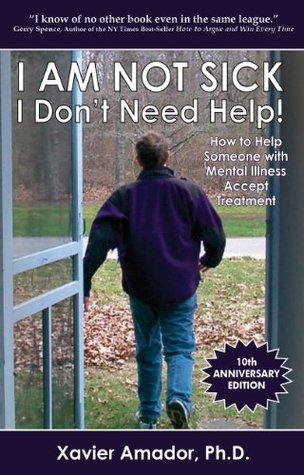More on this book
Kindle Notes & Highlights
Read between
September 16 - September 20, 2017
Indeed, their main complaint was usually feeling victimized by their family, friends, and doctors who were pressuring them to accept treatment for an illness they didn’t have!
“All I need to do is get a job. There’s nothing wrong with me.”
Everyone in denial or with anosognosia, knows he has at least one problem. The problem is you and everyone else who is telling him he needs help!
Apologize — “Before I tell you what I think about this, I want to apologize because it might feel hurtful or disappointing.” Acknowledge fallibility — “Also, I could be wrong. I don’t think I am, but I might be.” Agree to disagree — “And, I hope that we can just agree to disagree on this. I respect your point of view and I will not try and talk you out of it. I hope you can respect mine.”
1. Normalize the experience (“I would feel the same were if I was in your shoes.”). 2. Discuss only perceived problems/symptoms (Statements such as, “I can’t sleep at night because I’m constantly on guard. I am so afraid that they’re going to come and hurt me,” describe insomnia and paranoia stemming from a delusion. However, the words insomnia and delusion never need to be used in your discussions). 3. Review perceived advantages and disadvantages of treatment (whether rational or irrational). 4. Correct misconceptions (antipsychotic medications are not addictive; serious mental illness is
...more
Luckily, Dolores was on a research unit where we made a point of tracking down and obtaining copies of old medical records. This is something that almost never happens when someone who is seriously mentally ill is hospitalized,
normalize her experience,
discuss only those problems (and symptoms) Dolores mentioned herself.
review the advantages and disadvantages of treatment.
For one thing, if everyone (doctor and family) believes the patient is taking his medication regularly and it doesn’t appear to be working, they’ll assume it’s been given a fair trial when that is far from the truth.
“If anosognosia is a symptom of mental illness, like flat affect or hallucinations, can medicines help?”
Generally, anosognosia, like other negative symptoms, appears to be resistant to drug treatment.
Finally, cognitive therapy has proven to be effective for reducing the severity of certain symptoms in patients with psychotic disorders (See Chapter 17 on Psychotherapy for Psychosis).
Ideally, my order of preference is to: 1) Go together to the ER; 2) Call a mental health crisis team or an assertive community treatment team; or if all else fails, 3) Call the police and ask for officers from the department’s Crisis Intervention Team (CIT).
Verbally or physically abusive Suicidal ideas (e.g., “I wish I was dead,” “I should just end it all,” etc.) Harms self (e.g., cuts body parts, bangs head, drinks soap, eats dirt, etc.) Is destructive of property (own or others) Stalks others (e.g., incessant phone calls despite complaints, repeated unwanted visits, etc.)
Delusions of grandeur (e.g., has superhuman powers, is famous, knows famous people personally, etc.)
Delusions of persecution (e.g., being watched by government agents, possessed by the devil, fears loved ones intend harm, etc.)
Poor judgment
loses job due to “eccentric” behavior,
Although inpatient involuntary treatment typically requires that the mental illness make the person a danger to self or others, persons with chronic psychotic disorders who show certain patterns of behavior as a consequence of their illness may receive court-ordered treatment on an outpatient basis.
Treatment Advocacy Center
The system is set up to put a wall between mental health professionals and their patients’ families.
I did eventually try, and I encountered the same problem you have or soon will: No one would talk to me.
If you are a family member, remind the therapist that you can share your observations and concern without violating confidentiality laws.
mobile crisis team
Crisis Intervention Team
The doctor who does the diagnosis and intake for your loved one is going to be your biggest ally if your loved one needs to stay in the hospital longer stay than the 72 hours generally mandated by an emergency commitment.
Dr. Fred Freese (a consumer and psychologist with schizophrenia)
Most studies show that when hallucinations and delusions are worsened, the potential for violence increases dramatically.
More often than not, we are talking about people who became paranoid and/or grandiose,
“a majority of individuals with schizophrenia lacked insight into having a psychotic illness” and that this problem was “a manifestation of the illness itself rather than a coping strategy” (page 304, DSM-IV-TR, APA Press, 2000).


